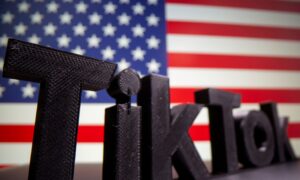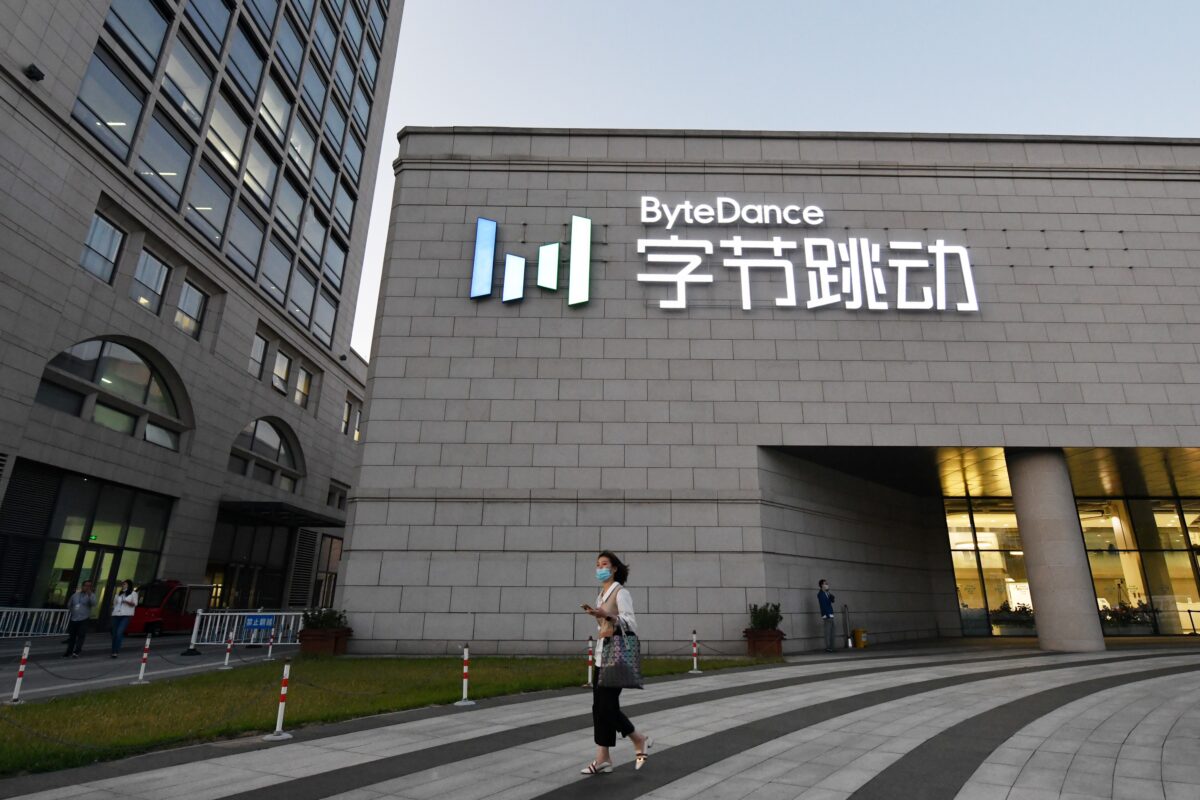TikTok Expanding to Everything
CommentaryTikTok is on a rampage, expanding into music, online purchases, search engines, fulfillment centers, and warehouses to rival not only Instagram, Facebook, and Google, but eventually Spotify, Apple Music, and Amazon. TikTok, and the Chinese regime that controls it, would like to be America’s “everything app,” an idea that Elon Musk is thinking about, too. Bad ideas come in pairs, and just as TikTok and Musk seek to control your phone and purchases, they also promote the increasing control of Beijing over Taiwan. The regime has a powerful influence over Musk and TikTok because they both have close business ties to China. On Oct. 7, the Financial Times published an interview with Musk in which he advocates turning Taiwan into a “special administrative zone” of China, like Hong Kong. Taiwan’s government was not pleased and responded that freedom is “not for sale.” TikTok is owned by Bytedance, headquartered in Beijing. If Musk owned Twitter, that place of moderate free speech could converge with and eventually be eclipsed by TikTok through the same kind of pressure from Beijing that likely led to Musk’s kowtow on Taiwan. A woman walks past the headquarters of ByteDance, the parent company of video sharing app TikTok, in Beijing on Sept. 16, 2020. (Greg Baker/AFP via Getty Images) We can’t trust a China-linked billionaire to own our freedom of speech. Neither can we trust what TikTok’s algorithms feed us daily. The evidence shows that on controversial topics, it serves its users misinformation, geared to Beijing’s interests, at the top of their feeds. We can expect new TikTok content and sales algorithms to serve sanitized media and products, with no “Free East Turkistan” music or “End the Genocide” t-shirts easily accessible. Spotify and Amazon could become a thing of the past, replaced by an algorithm that gives us Chinese Communist Party slogans and Xi Jinping “wisdom” every third song. Adding insult to injury, TikTok was reportedly found to capture the majority of donations to some charitable causes funded on its platform. One investigation found that TikTok pocketed as much as 70 percent of donations to “desperate, begging Syrian refugees.” Imagine if GoFundMe disappeared, to be replaced by a TikTok donation button that siphons off 70 percent of all good intentions? Yet many in the United States and its allies don’t see the threat of major social media companies controlled by Beijing. Last year, the Biden administration rescinded former President Donald Trump’s ban on TikTok. The head of Britain’s spy service, Jeremy Fleming at GCHQ, told an audience on Oct. 11 that he saw no problem with children using TikTok and encouraged them to do so. His only caveat was concern about the use of any data on teens’ devices. That would presumably include Western social media companies that use data as well. Spymasters shouldn’t be more naive than their bosses in the White House or 10 Downing Street. Fleming appears to have painted all social media with the same lenient brush. But his boss, the British prime minister, was smarter in calling for an unequivocal “crackdown” on companies like TikTok. A private company in a market democracy using teen data and purchases is far less dangerous than a company ultimately controlled by a totalitarian and genocidal dictatorship that seeks global hegemony, including through the step of using social media as everything apps adopted en masse by guileless teenagers in the West. If Beijing does not allow Google and Twitter in China, we definitely should not allow TikTok in the United States. Lack of reciprocity is one of many reasons to ban the app. The latest evidence of TikTok’s expansion are moves to trademark “TikTok Music” in the United States, apparently to compete with Spotify and Apple Music. TikTok is also on LinkedIn seeking to hire supply chain specialists for Amazon-style “fulfillment centers” and warehouses for product delivery. Like Amazon, TikTok could eventually get into the physical delivery business to customer front doors, to compete with UPS, FedEx, and the venerable U.S. Postal Service itself. Just imagine if current trends continue, and our USPS is displaced by a cheaper alternative from China. How far will unmitigated free traders push their self-destructive ideology before they realize not to rely on the enemy for strategic goods like communications and basic delivery services? Sadly, the Biden administration and some allies are asleep at the switch. They should be leading the way in removing all of China’s apps from U.S. devices, as India is in the process of doing. The kind of intellectual property and personal data theft that TikTok enables must end. Instead of a tough defense of America’s social media and e-commerce, what we hear from Washington on the issue of the gradual takeover of America’s digital everything is close to crickets. Views expressed in this article are the opinions of the author and do not necessarily reflect the

Commentary
TikTok is on a rampage, expanding into music, online purchases, search engines, fulfillment centers, and warehouses to rival not only Instagram, Facebook, and Google, but eventually Spotify, Apple Music, and Amazon. TikTok, and the Chinese regime that controls it, would like to be America’s “everything app,” an idea that Elon Musk is thinking about, too.
Bad ideas come in pairs, and just as TikTok and Musk seek to control your phone and purchases, they also promote the increasing control of Beijing over Taiwan. The regime has a powerful influence over Musk and TikTok because they both have close business ties to China.
On Oct. 7, the Financial Times published an interview with Musk in which he advocates turning Taiwan into a “special administrative zone” of China, like Hong Kong. Taiwan’s government was not pleased and responded that freedom is “not for sale.”
TikTok is owned by Bytedance, headquartered in Beijing. If Musk owned Twitter, that place of moderate free speech could converge with and eventually be eclipsed by TikTok through the same kind of pressure from Beijing that likely led to Musk’s kowtow on Taiwan.

We can’t trust a China-linked billionaire to own our freedom of speech. Neither can we trust what TikTok’s algorithms feed us daily. The evidence shows that on controversial topics, it serves its users misinformation, geared to Beijing’s interests, at the top of their feeds.
We can expect new TikTok content and sales algorithms to serve sanitized media and products, with no “Free East Turkistan” music or “End the Genocide” t-shirts easily accessible. Spotify and Amazon could become a thing of the past, replaced by an algorithm that gives us Chinese Communist Party slogans and Xi Jinping “wisdom” every third song.
Adding insult to injury, TikTok was reportedly found to capture the majority of donations to some charitable causes funded on its platform. One investigation found that TikTok pocketed as much as 70 percent of donations to “desperate, begging Syrian refugees.” Imagine if GoFundMe disappeared, to be replaced by a TikTok donation button that siphons off 70 percent of all good intentions?
Yet many in the United States and its allies don’t see the threat of major social media companies controlled by Beijing. Last year, the Biden administration rescinded former President Donald Trump’s ban on TikTok.
The head of Britain’s spy service, Jeremy Fleming at GCHQ, told an audience on Oct. 11 that he saw no problem with children using TikTok and encouraged them to do so. His only caveat was concern about the use of any data on teens’ devices. That would presumably include Western social media companies that use data as well.
Spymasters shouldn’t be more naive than their bosses in the White House or 10 Downing Street.
Fleming appears to have painted all social media with the same lenient brush. But his boss, the British prime minister, was smarter in calling for an unequivocal “crackdown” on companies like TikTok.
A private company in a market democracy using teen data and purchases is far less dangerous than a company ultimately controlled by a totalitarian and genocidal dictatorship that seeks global hegemony, including through the step of using social media as everything apps adopted en masse by guileless teenagers in the West.
If Beijing does not allow Google and Twitter in China, we definitely should not allow TikTok in the United States. Lack of reciprocity is one of many reasons to ban the app.
The latest evidence of TikTok’s expansion are moves to trademark “TikTok Music” in the United States, apparently to compete with Spotify and Apple Music. TikTok is also on LinkedIn seeking to hire supply chain specialists for Amazon-style “fulfillment centers” and warehouses for product delivery.
Like Amazon, TikTok could eventually get into the physical delivery business to customer front doors, to compete with UPS, FedEx, and the venerable U.S. Postal Service itself.
Just imagine if current trends continue, and our USPS is displaced by a cheaper alternative from China. How far will unmitigated free traders push their self-destructive ideology before they realize not to rely on the enemy for strategic goods like communications and basic delivery services?
Sadly, the Biden administration and some allies are asleep at the switch. They should be leading the way in removing all of China’s apps from U.S. devices, as India is in the process of doing. The kind of intellectual property and personal data theft that TikTok enables must end.
Instead of a tough defense of America’s social media and e-commerce, what we hear from Washington on the issue of the gradual takeover of America’s digital everything is close to crickets.
Views expressed in this article are the opinions of the author and do not necessarily reflect the views of The Epoch Times.












